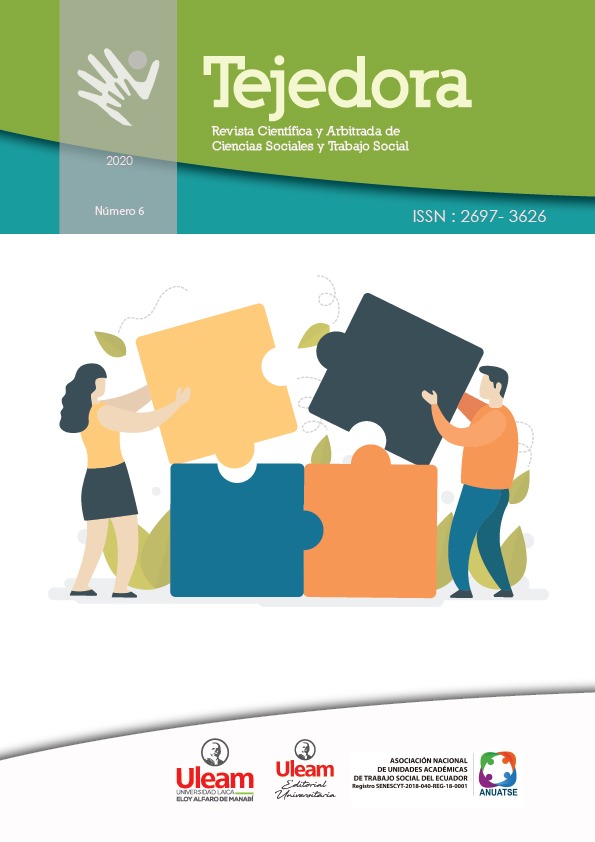FAMILY EMPOWERMENT AND ITS IMPACT ON CHILD LABOR IN GUAYAQUIL, SOUTH CENTER DURING 2022
DOI:
https://doi.org/10.56124/tj.v7i13ep.005Keywords:
Child labor, familym, empowerment, rights, vulnerabilityAbstract
The research carried out was developed as a consequence of the intervention process carried out in families of children in child labor situations, in the city of Guayaquil, during the period 2022. By virtue of this, the main objective was structured to determine family empowerment and its impact. on the family co-responsibility of parents of working children and adolescents in Guayaquil, describing how it influences the protection of rights and the denaturalization of child labor. As indicated in the Children and Adolescents Code, the family has the co-responsibility of guaranteeing the rights of children; however, there are sociocultural contexts that hinder the applicability of this commitment. Consequently, this work analyzed one of the factors that make the progressive eradication of child labor impossible from the family sphere. The methodology implemented was qualitative in nature, with a narrative design, the interview technique was applied, thus achieving an internal systemic and global family analysis of families that share the same problem, where through the results it was possible to understand that the interviewees consider the Family participation as fundamental in the upbringing of working children and adolescents. In conclusion, it was possible to analyze the importance of family participation in the upbringing of children and adolescents to contribute to the restitution of rights, therefore, it is necessary to understand the reality of homes and family dynamics as a starting point for interventions, deployed in favor of this priority attention group.
KEYWORD: Child labor, family, empowerment, rights, vulnerability
Downloads
References
Acuña San Martín, M. (2013). El principio de corresponsabilidad parental. Revista de derecho, 21-59.
Ávila, A. S. (2007). Trabajo infantil e inasistencia escolar. Revista Brasileira de Educação, 68-80.
CÓDIGO DE LA NIÑEZ Y ADOLESCENCIA. (2003). CÓDIGO DE LA NIÑEZ Y ADOLESCENCIA. Obtenido de file:///C:/Users/Maria/Downloads/ARTICULO%20CIENTIFICO/REFERENCIAS/2.%20CODIGO-DE-LA-NINEZ-Y-ADOLESCENCIA.pdf
Constitución de la República del Ecuador . (2008). Constitución de la República del Ecuador . Obtenido de https://www.oas.org/juridico/pdfs/mesicic4_ecu_const.pdf
Cutri, A., Hammermüller, E., Zubieta, A., Müller Opet, B., & Miguelez, L. (2012). Trabajo infantil: una problemática social que nos compromete. Archivos argentinos de pediatría, 350-358.
Diaz, C. L. (2005). Manual de derecho de familia y tribunales de familia. Librotecnica.
Duro, E. (2007). Enfoque integral de derechos y trabajo infantil: oportunidades y desafíos. Susana Aparicio et al. El trabajo infantil en la Argentina. Análisis y desafíos para la política pública. OIT, Ministerio de Trabajo, Empleo y Seguridad Social, 53-74.
Figueroa, V. G. (2015). Corresponsabilidad familiar y el equilibrio trabajo-familia: medios para mejorar la equidad de género. Polis. Revista Latinoamericana, 3-18.
González Cárdenas , F. D., Narváez Zurita, C. I., Gerra Coronel, M. A., & Erazo, J. C. (2020). Protección para niños, niñas y adolescentes: La protección integral prevista en la constitución ecuatoriana. Iustitia Socialis: Revista Arbitrada de Ciencias Jurídicas y Criminalísticas, 397-414.
González, T. (2022). Plataforma Gubernamental de Desarrollo Social.
López, J. A. (2020). El trabajo infantil en Ecuador. Revista Científica Multidisciplinaria, 59-66.
Miranda, N., & González, A. (2016). El enfoque de derecho de la infancia y adolescencia en el contexto chileno. Humanidades Médicas, 459-474.
Murillo Torrecilla, J., & Román Carrasco, M. (2014). CONSECUENCIAS DEL TRABAJO INFANTIL EN EL DESEMPEÑO ESCOLAR. Latin American Research Review.
Naciones Unidas. (2017). Derechos Humanos. Ginebra: Naciones Unidas. Obtenido de https://www.ohchr.org/sites/default/files/Documents/Publications/HandbookParliamentarians_SP.pdf
Oficina Internacional del Trabajo & Fondo de las Naciones Unidas para la Infancia. (2021). Trabajo infantil: Estimaciones mundiales 2020. Geneva and Nueva York: CC BY 4.0.
ONU. (2015). NACIONES UNIDAS. Obtenido de https://www.un.org/sustainabledevelopment/es/objetivos-de-desarrollo-sostenible/
Organización Internacional del Trabajo . (2023). Organización Internacional del Trabajo. Obtenido de https://www.ilo.org/global/standards/subjects-covered-by-international-labour-standards/child-labour/lang--es/index.htm
Romero Mendoza , V., Amar Amar, J. J., Palacio, J., Madariaga Orozco, C., Sierra Crisson, E., & Quintero González, S. M. (2012). Factores familiares y sociales de alto riesgo asociados al trabajo infantil en ciudades de la Costa Caribe colombiana. Universitas Psychologica, 481-496.
Sampieri, R. H. (2014). Metodología de la Investigación. Colombia : McGRAW-HILL / INTERAMERICANA EDITORES, S.A. DE C.V.
Santillán Torres, M. F. (2011). Derechos que vulnera el trabajo infantil según la doctrina de protección integral y la normativa ecuatoriana. Quito: PONTIFICIA UNIVERSIDAD CATÓLICA DEL ECUADOR.
Published
How to Cite
Issue
Section
License
Copyright (c) 2024 Revista Científica y Arbitrada de Ciencias Sociales y Trabajo Social: Tejedora. ISSN: 2697-3626

This work is licensed under a Creative Commons Attribution-NonCommercial-ShareAlike 4.0 International License.






















